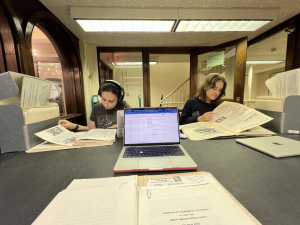Research Enables Undergraduate Students to Move From Absorbing Knowledge to Creating It
Duke is among the top universities for research, but when you think of research, do you think of undergraduates?
If you answered no, think again. Research isn’t only for faculty or graduate students; undergrads can begin participating in research in a multitude of ways from as early as their first year at Duke.
In partnership with Directors of Academic Engagement, faculty and students from across Trinity programs took time this year to explain the value of research experiences for undergraduates and break down the elusive process of finding a research project.
From Dance and English to Biology and Neuroscience, these faculty demonstrate the various types of research available to students in all areas of Duke while breaking down myths that research is out of reach.
Research is everywhere
The process of collegiate research is a new one for many students — often different from the type of research they have been exposed to in previous settings. These faculty discuss research not only as a way to achieve a particular outcome, but as a way to push towards truths and reach better understandings of the world around us.
“Every great thing in human history has been a product of research. And in fact you might be contributing to advances that may lead to other advances….It’s so exciting!” says Mohamed Noor, interim dean of Trinity College of Arts & Sciences and professor of Biology.
Start with a passion
If students sometimes feel overwhelmed by the options available to them, they aren’t alone, says Bridgette Hard, professor of the practice of Psychology & Neuroscience. There are many options for students at Duke to pursue research, whether through independent study or working with established, interdisciplinary Duke programs like Bass Connections or Story+.
The first step in research is taking a step — any step — especially if it is still the first year.
“You don’t have to know what you are going to do in life. You just have to think about what your singular next step is going to be, and that step should be something that scares you a little bit and excites you a little,” says recent alumna Tyler Edwards.
As students grapple with the abundance of resources provided by Duke, faculty suggest that students start with self-examination, looking inward to what interests and excites them as a motivator for future research.
Finding partners in research
At Duke, there are many avenues to connect to others doing research and lots of people who are interested in helping. The key is finding the right people.
“The institution is resource rich,” says Iyun Ashani Harrison, associate professor of the practice in Dance. “Access to intellectuals, to ideas, it influences your processes, your research, how you imagine yourself in the world and what you might be able to do.”
Some of the ways students build meaningful connections with faculty and peers are through programs like FOCUS and What Now? that allow for extended time for students to engage with faculty and their peers. Students can also look to graduate students for guidance and research opportunities.
There’s also Muser, a research navigator at Duke created by biology professor Sheila Patek. With more than 3000 registered users, Muser is changing the structure and culture of academic research at Duke by making undergraduate research opportunities from all disciplines more visible and accessible.
Hear students share the programs and ways through which they have connected to meaningful research projects during their time at Duke.
What is successful research?
Sometimes research fails. You uncover information or results that you didn’t expect. Plans fall apart, or new hurdles appear along the way. What’s next? Duke researchers discuss why this isn’t necessarily a bad thing and how “failing” research might actually be successful in the long run.
“Nothing is unproductive in research…and nothing is unproductive in the way you get involved in research at Duke. Everything is a learning process,” says Director of Academic Engagement Jules Odendahl-James.
The unexpected gifts of research
The benefits of engaging in research aren’t limited merely to research outcomes.
“Meeting people that you didn’t know you should know,” is one of the most important outcomes of participating in research according to Candis Watts Smith, associate professor of Political Science. Listen as other faculty and students share the benefits they have found from participating in research at Duke.
To take the next step — or the first step — in exploring research opportunities at Duke, students can make an appointment with the Academic Advising Center to speak one-on-one with an academic counselor.
Research Roundup: What have Trinity students been up to?
Approximately half of the students in Trinity will complete a research project during their time at Duke. Here are a few of the ways our students have engaged in research over the last year:















